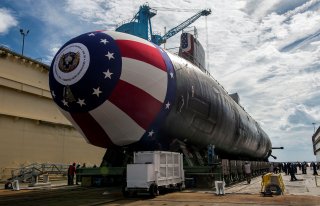The U.S. Navy’s Leading Supplier of High-Strength Submarine Steel Provided Subpar Metal
The Department of Justice alleges that the director of metallurgy falsified test results to hide the fact that the steel had failed quality tests.
The Department of Justice (DoJ) has announced that Bradken Inc., a subsidiary of Hitachi Construction Machinery, agreed to pay $10. 9 million to resolve allegations that it produced and sold substandard steel components that were used in U.S. Navy submarines.
The alleged fraud involved more than two hundred production runs of steel, which represent a substantial percentage of the castings that Bradken produced for submarines built by Electric Boat Company and Newport News Shipbuilding.
While specific submarines haven’t been named, the shipbuilders have each produced multiple Virginia-class and Columbia-class submarines. It is also unclear if this revelation will further slow current U.S. submarine production.
Falsified Lab Results
The Kansas City-based company had been the Navy’s leading supplier of high-strength steel for submarines, but in actuality provided subpar metal when a longtime employee falsified lab results. The steel was produced at a Bradken-owned foundry in Tacoma, Washington—which the company then used to produce steel castings that prime contractors use to fabricate submarine hulls. The Navy requires that the steel meets certain standards for strength and toughness to ensure that it would not fail under certain circumstances, such as a collision.
According to the DoJ’s court filings, for thirty years, the Tacoma foundry, which Bradken acquired in 2008, produced castings that had failed lab tests and did not meet the Navy’s standards. The filings allege that Elaine Thomas, as director of metallurgy, falsified test results to hide the fact that the steel had failed the tests. She allegedly falsified results for over two hundred productions of steel, which represent a substantial percentage of the castings Bradken produced for the Navy.
Bradken had reportedly learned in 2017 that the results had been falsified, which indicated that the steel was strong enough to meet the Navy’s requirements. Federal prosecutors have said that the company did disclose its findings to the Navy but wrongfully suggested that the discrepancies were the result of human error not the result of fraud. That likely hindered the Navy’s efforts to determine the scope of the problem, but also how to remediate the risks the subpar steel presented to sailors serving on the submarines.
As part of the deferred prosecution agreement, Bradken admitted these allegations.
“Bradken placed the Navy’s sailors and its operations at risk,” said U.S. Attorney Brian T. Moran.
“Further, after Bradken’s management discovered the falsified data, they misled the Navy about the scope and nature of the fraud,” added Moran. “Government contractors must not tolerate fraud within their organizations, and they must be fully forthcoming with the government when they discover it. The Navy has taken extensive steps to ensure the safe operation of the affected submarines. Those measures will result in increased costs and maintenance. Our agreement with the company is aimed at ensuring they improve their procedures and inform their peer companies about how their systems failed to detect the fraud. We hope such steps will improve the military procurement system.”
World-Class Expert Metallurgist Involved
Thomas, who was charged criminally with one count of major fraud against the United States, worked in various capacities at the lab for forty years. She is a metallurgist with a national reputation and in 2014 received a Steel Founders Society award for her contributions. The society had described her as a “world-class expert” and she had been credited with developing procedures to make technically complex nuclear castings for the Navy Military.com reported.
In her interviews with federal investigators, she acknowledged that alternations on test cards were in her handwriting but said she hadn’t purposefully falsified the results. She later stated that castings that had failed yield strength tests should have not have shipped.
Thomas will make her initial appearance in federal court in Tacoma on June 30, 2020.
As part of the deferred prosecution, Bradken will overhaul its quality control procedures and create a new oversight position of lab testing. In addition, it must publish a detailed account of the missteps in the trade publication Casteel Reporter to educate other government contractors.
“While we regret that our internal controls were inadequate to detect the issue sooner, the employee acted with no prior knowledge or involvement from the management,” a statement Bradken released on Monday noted. The company also said it was pleased to have reached a resolution with the DoJ.
If Bradken complies with the agreement, then the government will dismiss the charge after three years.
Peter Suciu is a Michigan-based writer who has contributed to more than four dozen magazines, newspapers and websites. He is the author of several books on military headgear including A Gallery of Military Headdress, which is available on Amazon.com.
Image: Reuters

